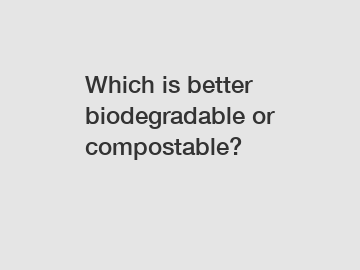Mar. 19, 2024
When it comes to choosing eco-friendly products, it's important to understand the difference between biodegradable and compostable items. Both are great alternatives to traditional plastics, but they have different characteristics that make them suitable for different purposes. In this article, we will explore the advantages and disadvantages of biodegradable and compostable products to help you make an informed choice.
What does biodegradable mean?
Biodegradable products are materials that can break down naturally in the environment with the help of microorganisms. These items will eventually decompose into natural elements like water, carbon dioxide, and biomass. Some common biodegradable materials include paper, certain plastics, and plant-based materials like cornstarch.

Pros of biodegradable products:
1. Reduce waste in landfills: Since biodegradable products can break down naturally, they help reduce the amount of waste in landfills.
2. Lower carbon footprint: Biodegradable items do not release harmful chemicals when they decompose, reducing their impact on the environment.
Cons of biodegradable products:
1. Time to decompose: Some biodegradable materials can take a long time to break down, depending on the conditions they are exposed to.
2. Limited recycling options: Not all biodegradable products can be recycled, so they may end up in the landfill anyway.
What does compostable mean?
Compostable products are similar to biodegradable items but with one key difference: they can break down into nutrient-rich compost that can be used to enrich soil. Compostable materials usually break down faster than biodegradable items and are often made from organic matter like food scraps and plant fibers.
Suggested reading:Pros of compostable products:
1. Nutrient-rich soil: Compostable items can be turned into valuable compost that helps improve soil quality and promote plant growth.
2. Faster decomposition: Compostable products tend to break down quicker than biodegradable materials, reducing their impact on the environment.
Cons of compostable products:
1. Specific conditions required: Compostable items need to be processed in a composting facility to break down properly, which may not be available in all areas.
2. Not all compostable products are created equal: Some compostable items may contain chemicals or additives that hinder their ability to break down naturally.
So, which is better: biodegradable or compostable?
The answer depends on your specific needs and circumstances. Biodegradable products are a good choice for reducing waste in landfills and lowering your carbon footprint. On the other hand, compostable items are ideal for creating nutrient-rich compost and breaking down quickly in the environment.
In conclusion, both biodegradable and compostable products have their own set of advantages and disadvantages. It's important to consider your goals and the end-of-life options for these products when making a decision. Whether you choose biodegradable or compostable items, you are taking a step towards a more sustainable future for our planet.
If you have any questions about biodegradable or compostable products, please feel free to contact us. We are happy to help you find a reliable supplier that meets your eco-friendly needs.
If you are looking for more details, kindly visit resin degradable supplier, compostable resin Manufacturer, What Is PBAT Plastic Used for.
Suggested reading:Previous: What is the breakdown of PBAT?
Next: None
Related Articles
If you are interested in sending in a Guest Blogger Submission,welcome to write for us!
All Comments ( 0 )